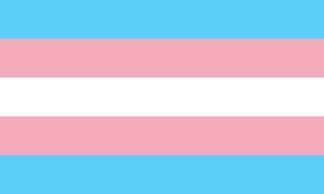Tranny
| Part of a series on |
| Transgender topics |
|---|
 |
|
Health care and medicine
|
|
Rights issues |
|
Society and culture |
|
By country
|
|
|
Tranny (or trannie) is a slang term for a transgender, transsexual, transvestite, or cross-dressing person, generally considered to be derogatory or offensive.[1][2] During the early 2010s, there was confusion and debate over whether the term was a pejorative, or was still considered acceptable, or even a reappropriated term of unity and pride. By 2017, however, the word was banned by several major media stylebooks and considered hate speech by Facebook.[3][4]
History
Roz Kaveney wrote in The Guardian in 2010 that tranny had recently appeared to be undergoing reappropriation to be used with pride by trans activists, but "it didn't take", due in part to the word's continued currency as a term of abuse.[5] Lance Bass said in 2011 that he had thought the term was not a slur, having heard it frequently on RuPaul's Drag Race or Project Runway, but apologized for using the term on Access Hollywood after learning from The Advocate and the Gay & Lesbian Alliance Against Defamation (GLAAD) that it was no longer acceptable.[6] GLAAD's 2011 Transgender Resource Page said the term is "usually considered offensive and/or defamatory to transgender people".[7]
Trans activists like Justin Vivian Bond, Kate Bornstein, and drag queens such as RuPaul and Lady Bunny have advocated for use of the term.[8] Bond said in 2014 that banning the word does not eliminate transphobia but only, "steal[s] a joyous and hard-won identity from those of us who are and have been perfectly comfortable, if not delighted to be trannies."[8] At the same time, RuPaul said "I love the word tranny," and that the word was not being redefined by the transgender community, but only by "fringe people who are looking for story lines to strengthen their identity as victims".[9] Kate Bornstein said the word was used in the 1960s and 1970s in Sydney, Australia by trans people as "a name for the identity they shared", but said no one should think Bornstein was giving them permission to use the term to describe anyone without first knowing the term they used for their gender identity.[10] Cristin Williams reviewed historic uses of the term and found the first published instance in 1983, originating among gay men, and expressed doubt that it originated many years prior to this.[11]
In 2014, the Tranny Awards changed its name to the Transgender Erotica Awards, citing feedback from the "extended trans adult community" as a reason to stop using the term.[12] In 2017, Facebook's anti-hate speech algorithms were blocking posts containing tranny, as well as dyke or fag.[3]
References
- ↑ "Tranny", Dictionary.com
- ↑ "Tranny", The American Heritage Dictionary of the English Language (5th ed.), 2017
- 1 2 Dottie Lux; Lil Miss Hot Mess (2017-08-14), "Facebook's Hate Speech Policies Censor Marginalized Users", Wired
- ↑ GLAAD Media Reference Guide - AP, Reuters & New York Times Style, Gay & Lesbian Alliance Against Defamation
- ↑ Kaveney, Roz (2010-06-30). "Why trans is in but tranny is out". London: The Guardian. Retrieved 2017-05-18.
- ↑ Bass, Lance (23 December 2011). "Lance Bass Apologizes For Using The Word 'Tranny'". The Huffington Post. Retrieved 18 May 2017.
- ↑ "GLAAD's Transgender Resource Page". Gay & Lesbian Alliance Against Defamation. Archived from the original on 2011-01-03.
- 1 2 Lowder, J. Bryan (30 May 2014). "Is "Tranny" Always a Slur?". Slate Magazine. Retrieved 18 May 2017.
- ↑ Nichols, James (2014-05-22). "RuPaul Responds To Controversy Over The Word 'Tranny'". The HuffingtonPost. Retrieved 2017-05-18.
- ↑ Bornstein, Kate. "Who You Calling A Tranny?". Kate Bornstein is a Queer and Pleasant Danger. Retrieved 24 June 2015.
- ↑ Williams, Cristan (2014-04-28), Tranny: An Evidence-Based Review, The TransAdvocate, retrieved 2017-05-18
- ↑ Molloy, Parker Marie (2014-03-14), "'Tranny Awards' Changes Its Name, Not Its Nature", The Advocate
| Look up tranny in Wiktionary, the free dictionary. |